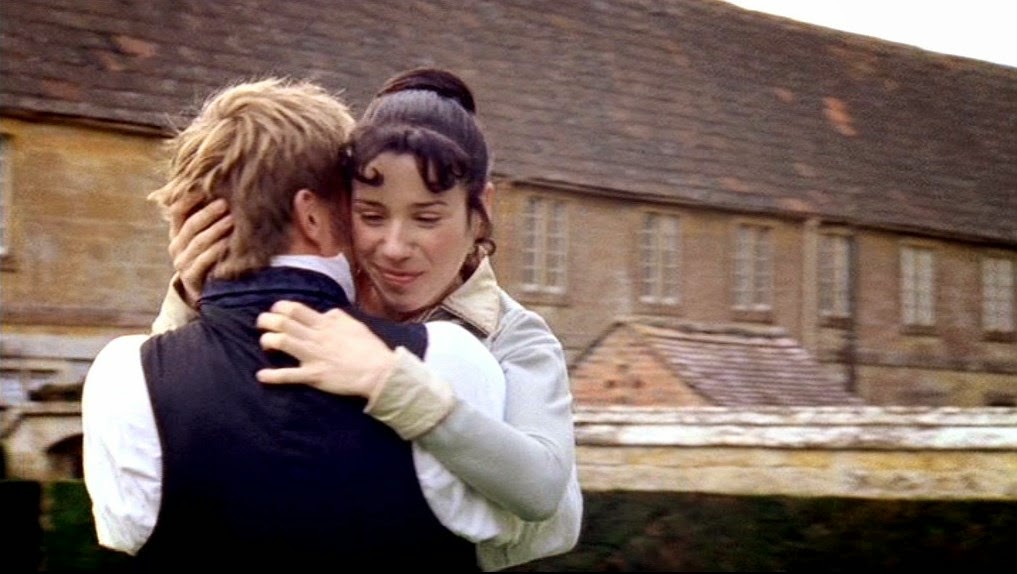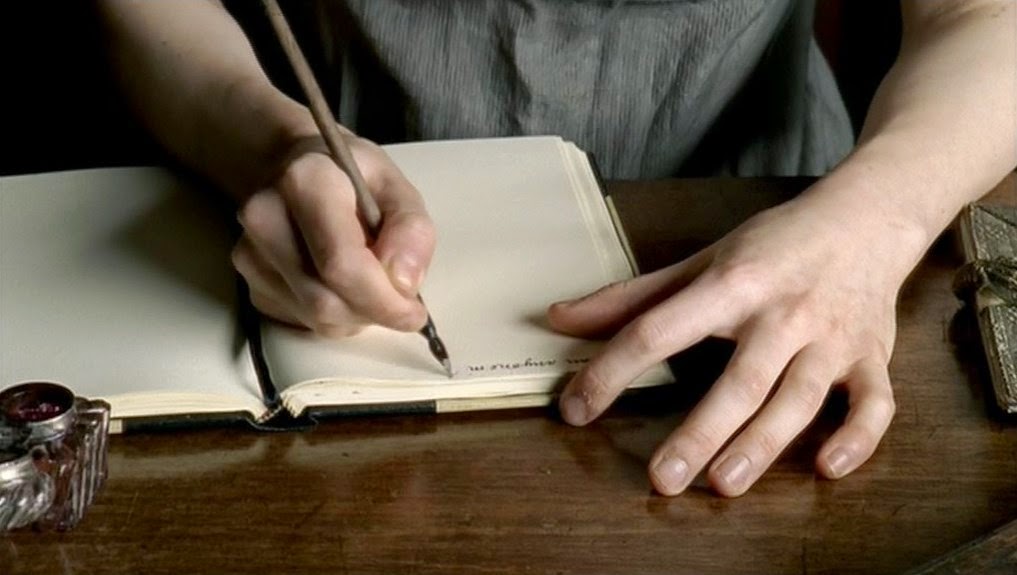It has been pointed out that Anne Elliot is Austen’s most practically perfect heroine. She hardly ever misreads a person or situation, acting throughout with a “steadiness of principle” and “the resolution of a collected mind.”
She can be puzzling sometimes, for readers trying to figure out character development and the lessons she’s learned by the end. Interestingly, I think this is because hers is actually a flat character arc. As above mentioned, a lot of her personal character development has crystallized before the story proper begins. (This isn’t to say she doesn’t learn things or develop over the course of the story), but much of the shift and change in Persuasion happens around her and within other people coming into contact with her.
Like a jewel—sitting in the dark before being turned brilliantly to the light—Anne Elliot can seem at first glance merely quiet and unobtrusive, but by the end her steadfast strength, integrity, gentleness, loyalty, and love shines out radiantly. A trustworthy confidante and counselor, she is thoroughly worthy of a friend’s full confidence and of a strong man’s love.
Captain Wentworth is one of my favorite heroes. Flawed yet overcoming his flaws, turning away from his bitterness and anger and resentment, he is a true man and a worthy hero. Though passionate in love as in war, he isn’t obsessive. His love—with its depth and humor and energetic activity—opens up Anne’s world, opening it to further friendships as well, as he feeds and cares for her physically, intellectually, and emotionally.
Persuasion is full to the brim from the start (from before the start!) with indirections and misunderstandings—with all the hurt and awkwardness and aching silence of the things that cannot be said. Accordingly, in its climactic ending scene Peter Leithart says (in his book Miniatures and Morals) that Austen, “concocted a scene that is one of the most famous in English literature, and which more precisely represents the tensions and difficulties and indirections of love than virtually any scene in literature.”
Throughout the book, Anne understands Wentworth—listening to him and reading his comments, his gestures, his glances. Now she speaks and it is Wentworth listening. “Anne has gained her voice, gained a hearer, communicated with her lover in the only way she can—by speaking to him through a third party.” (Leithart)
Anne and Harville’s entire debate at the White Hart is magnificent. Harville says at one point: “All histories are against you—all stories, prose and verse… Songs and proverbs all talk of woman’s fickleness. But perhaps, you will say, they were all written by men.” Anne (almost immediately) counters by saying, “Men have had every advantage of us in telling their own story. Education has been theirs in so much higher a degree; the pen has been in their hands. I will not allow books to prove anything.”
Leithart here again points out that, “Between these two portions of the debate, Harville and Anne are interrupted by a sound from Wentworth’s writing desk—the sound of a pen falling from his hand! In this story, at least, the pen has been wrested from the hand of a man, and the woman’s constancy has been as superlative as any man’s.”
He goes on to say: “Anne’s rejection of male writing on women’s inconstancy is said in jest, but it fixes attention on an important theme in Persuasion. The book, after all, is mainly about the indomitable, unchangeable, eternal love of a woman for a man. …Anne is fully persuaded from beginning to end that Wentworth is the man, the only man, she could love. She perfectly exemplifies the ‘privilege’ she claims for her own sex—‘that of loving longest, when existence or when hope is gone.’ Love that endures when hope is past—this is love by faith, by sheer endurance, by persuasion of things not seen. Wentworth takes up his pen again, and when he does it is to record his constancy in love for Anne.
“Wentworth is a sea captain; he is no landed gentleman… Anne is his shore, the shore that he finally finds, the only shore he needs or wants. Like every shore, she was there all the time, constant, awaiting his return. Organized by real merit and self-sacrifice rather than vanity and pride, the naval community is the wave of England’s future. And with it comes the possibility of recognizing, against the pens of men, the persistence of a woman’s love.”
Truly beautiful!










Captain Wentworth!!! *huge sigh* yes...he is my favorite in all Austen movies. Even better than Mr. Darcy! ;)
ReplyDeleteJulia,
DeleteI do waver sometimes when seeing the '95 P&P and the '09 Emma, so, to be quite fair, I have to consider it a tie :), but (*huge sigh in return*) yes, most definitely! ;)
In my opinion it seems that while Anne is one of Austen's most perfect characters, Wentworth is one of her most flawed heroes. It makes for an interesting match.
ReplyDeleteThis was a great read! Thanks!
Susanna,
DeleteGood point! And it does make for a very interesting match. :) So glad you enjoyed it!
Very interesting point about Anne being the fixed, immovable place who has done her growing already, and it's Wentworth who has to change and come to her. Cool insights.
ReplyDeleteHamlette,
DeleteI'm so happy you enjoyed it! (Really....quite happy. ;D)
I need to read Persuasion so much. It sounds so so so lovely. Even better than the movies, of course. ;)
ReplyDeleteNatalie,
DeleteThou. Must. Read. It. Now. :) No, of course, whenever your reading schedule permits. ;) But I can't wait to hear your thoughts!
Now I'm definitely going to read Persuasion, dear Heidi! I love the movie so much:). Hope you're having a lovely day! Kelly xx
ReplyDeleteKelly-Anne,
DeleteI'm so very, very glad you're planning to read it!
And thank you! I am having a lovely day. It's very full, but going well. I hope you are, too!
Oh how wonderfully written, Heidi! It makes me want to pick up the book right this minute and devour it before lunch! :)
ReplyDeleteSarah!
Delete*I'm smiling happily ;)* Thank you so much! And I really can't wait till you can read it! :)
Someday I'll read this! :)
DeleteNice review! When I first read Persuasion in college I thought Austin was being a little to self-righteous. Then I saw the Royal Shakespeare Co.'s production in the nineties and felt it was the most romantic of the Austin books, rivaling even Pride and Prejudice. I can now with the wisdom of time truly appreciate this book. I also appreciate the insight you give into Anne and Wentworth.
ReplyDeleteSharon,
DeleteThanks so much for stopping by and commenting! I truly appreciate hearing your thoughts and I'm so glad you enjoyed it! I agree. While I think Austen might have adjusted some things if she'd been able to edit it more later, I think Persuasion is still her most mature work -- subtle, understated and most definitely romantic. :)